Racism
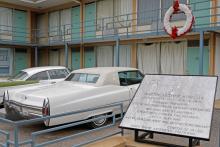
The deepest roots of The Shalom Center’s work to revitalize the deep connection between the Spirit and social justice were my weaving in 1968 and ’69 a new kind of Passover Seder — the Freedom Seder. My sense of the need to create the Freedom Seder grew from the deep crisis of American democracy in those years. For me, one crucial aspect of that crisis was the murder of Dr. Martin Luther King on April 4, 1968. It was an act of violence ending the life and disrupting the work of our foremost teacher of nonviolence.
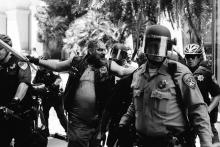
According to court documents, California Highway Patrol (CHP) worked with and expressed sympathy with the neo-Nazi Traditionalist Workers Party (TWP), treating them as victims and attempted to protect their identity.
8. What Amazon Does to Poor Cities
Is any new job a good job? As cities scramble to lure Amazon’s HQ2, a look at what the massive influx of warehouse jobs has changed cities.
9. Nearly 9,000 DACA Teachers Face an Uncertain Future
“Maria Rocha, a teacher in San Antonio, Texas, says it's gut wrenching, but she's trying not to show it in front of her third-graders. … It's even harder, she says, because some of her students are also at risk of being deported.”
10. Groundhog Sees Jungian Shadow, Predicts Everlasting Winter of the Soul
“We aren’t sure what was different this year, usually he either calls for six more weeks of winter or an early spring, not unending self-inflicted spiritual torment.” #2018

The State of the Union speech last night reveals a divided nation. In the sharpest contrast, a “Unity Declaration” is being released today by a very broad and diverse group of nearly 80 Christian leaders focusing on the integral connection between racism and poverty — which, for us, are issues of faith we are committed to overcoming together.

BY ABOUT SIXTH grade, a set of kids in the professional middle-class suburb where I grew up stopped doing homework, or really much work at all. They’d goof around in everything from math class to gym period. Getting average grades or being sent to the principal’s office for misbehavior didn’t seem to bother them that much. And their parents seemed to greet it all with a shrug.
It looked like good fun to me, so I figured I’d give this not-giving-a-damn thing a try. My parents greeted my Bart Simpson attitude with something stronger than a shrug.
I remember their fury after a school meeting where the teacher must have explained that my grades had fallen because I spent class time chatting with friends rather than focusing on worksheets. Right before the hammer came down, I attempted a weak protest: “But none of the other kids are doing work in class either,” and ticked off a set of names that my parents knew.
“You are not like them,” came the stern response.
This confused me. I thought I was like them. I played sports and video games, watched MTV and worshipped skateboarder Tony Hawk, just like all the other 12-year-old boys.
“If you are not head-and-shoulders above the next candidate in a hiring process,” my mother sternly said, “they will not give you the job.” She repeated: “You are not like them.”

While long quietly politically engaged, many at the school have taken on a noticeably more public stance toward actions from the Trump administration.

Donald Trump’s hateful words spoken in the Oval Office have been now been heard around the world and may be among the most ugly and harmful words to ever come from the White House of the United States of America. The people of America and around the world have heard that Trump asked, “Why are we having all these people from shithole countries come here?” The “shithole” countries named were those in Africa, as well as Haiti and El Salvador — places from which he didn’t want more people to come to America. Instead he said he would like more people from “places like Norway.” The message, about the color of skin the people Trump wants and doesn’t want in America, was clear.
1. I Wanted to Do a Good Deed. I Talked Myself Out of It Because I Thought of All the Ways I Might Get Killed
“I almost pulled up to the house right then, but I decided to drop off my daughter first. Should something go awry, I do not want my daughter there.
Should something go awry.”
2. How to Survive a Bomb Cyclone
A very practical how-to for those of us on the East Coast.

TO LOOK AT HIM, you know he’s lived a hard life. With ridges creasing his 27-year-old face, my cousin Shack looked me in the eye during a family gathering and helped me understand how hopeless he feels. The people in his Newark, N.J. neighborhood are being pushed out of their community. The Whole Foods and condos that are moving in are raising the costs of rent and food. The neighborhood’s old guard can’t keep up. This is the case in almost every city across the country. In my own neighborhood—Petworth in Washington, D.C.—I have watched condos rise around me and Starbucks and small bistros move in over the last six years. When I moved here in 2011, taxi drivers and community veterans told me that, until recently, they considered Petworth one of the most dangerous and impoverished neighborhoods in D.C. Gutted by the violent uprising in response to the assassination of Martin Luther King Jr. in 1968, the adjacent neighborhood Columbia Heights lay abandoned by city services and industry, and given over to poverty and violence, for more than three decades. When the city decided to develop Columbia Heights, it was only a matter of time before they would do the same to Petworth. “But gentrification is not the problem,” Shack said. “Poverty is the problem.” I heard those words and I wanted to push back. The anti-poverty advocate in me wanted to say, “Get with the program, cuz. Gentrification is the devil.” But Shack had a point, a good one. Obviously, repair and development of the neighborhood isn’t the problem—it’s the displacement of often-poorer people by more affluent people that usually goes with it. These neighborhoods should have been repaired and developed decades ago according to the desires of their homeowners and residents.

Tuesday night was a surprise — a joyful surprise to many of us who have grown accustomed to seeing our country’s immorality find new depths. White racial bigotry lost Tuesday in Alabama. Misogyny, the abuse and mistreatment of women, lost Tuesday in Alabama. And let’s be clear: It was black voter turnout — and black women, in particular, who voted against Judge Roy Moore by 98 percent — that made the difference.
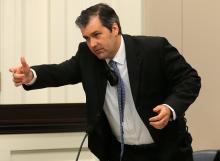
On April 15, 2015, Slager tased and shot Scott five times in the back. A video from witness Feiden Santana surfaced, showing the fatal shooting.

George Clooney’s new film Suburbicon is very obviously a response to the MAGA line of thinking. The film uses two parallel stories to explore both the hidden nastiness of the archetypal white, suburban family, and the day-to-day racism faced by an African American family trying to achieve their own American dream. It’s a setup ripe with allegorical potential, but while Suburbicon is built on good bones, it’s an unfocused mess that wastes its opportunity.

More than 60 years ago, the divinity school denied him admission because he is black. Speaking at a service in Goodson Chapel, he asked: “What is it that God would have Duke Divinity School do in light of that history? For if one is not honest about that history, one can’t be fully present.”
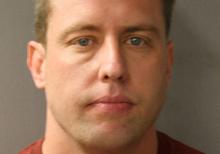
"I’m sad, I’m hurt, I’m mad,” the Reverend Clinton Stancil of the Wayman AME Church in St. Louis said by telephone. “But this was expected. We haven’t made any progress since Ferguson, that’s clear. Cops can still kill us with impunity."

When asked about the tweet, Sanders replied, “I think that’s one of the more outrageous comments that anyone could make, and certainly something that I think is a fireable offense by ESPN.” There’s a revealing irony in this statement. I’m sure that Donald Trump and Sarah Huckabee Sanders do not think they are involved in white supremacy. I’m sure that they are not card-carrying members of any white supremacist group. But I’m also sure that they are unconsciously guided by white supremacy.

The remarkably human and loving response to imperiled neighbors in Houston stands in stark contrast against the hateful racial ugliness that paraded through the streets of Charlottesville earlier in the month as angry white supremacists — KKK, Neo Nazis, “alt-right” members — marched publicly and proudly without sheets shouting anti-black and anti-Semitic assaults, and ultimately led to the death of Heather Heyer. The lighted torches, fear, hate, and violence of Charlottesville was such a shameful juxtaposition to the self-sacrificial love and service across racial lines that the disasters caused by Hurricanes Irma and Harvey evoked from people.
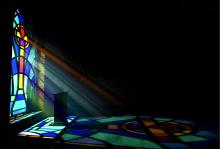
It’s my prayer that the loudest voice in the room will become the voice of sanity. That the voice is a collective voice that can only come from a gathering of people humbled before God’s love and not from a Facebook post gone viral. This is the greatest hope we have, that we are not alone and we can face each other with dignity and respect. This way of thinking shifts the focus of our faith from internal to external, from institutional to missional. To borrow from Dr. King, none of us know what will happen to us, but we’ve been to the mountaintop and seen what’s around the bend. It is costly grace that will lead us home, into the very heart of God in which we all dwell together. Cheap grace will divide us as the lure of acceptance without repentance turns us inward to only forgive and to sanction what is most familiar while rejecting those whom are cast outside our circle of care.
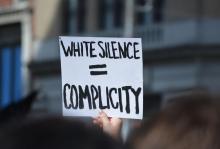
"Our faith is rooted in the incarnation, life, death, and resurrection of Jesus Christ, and his teachings claim authority in life and in death.
We reject as false doctrine any other claim on our lives—whether contrived of state or reason—that violates Jesus’ ethic of the equal and inestimable dignity of all people, each created in the very image of God and as such equally created with the divine call and capacity to sustain, protect, and serve the world."

White supremacy has been a staple in much of the American and European Church. This marriage of racism to the gospel is proudly displayed on a mantle when people say America was founded on Christian principles. The so-called return to Christian values means a return to a time when white supremacy was uncontested philosophy and policy.
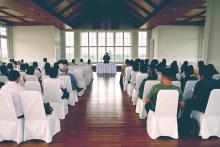
What now? Where do churches go from here? Here are five initial thoughts I would like to share, knowing the answer isn’t simple — it will take our collective discernment from the whole diversity of our churches to continue addressing our post-Charlottesville way forward.